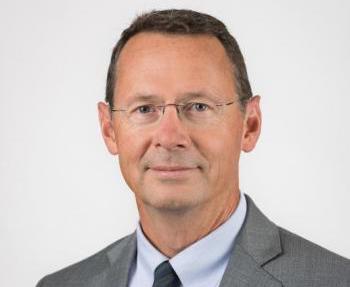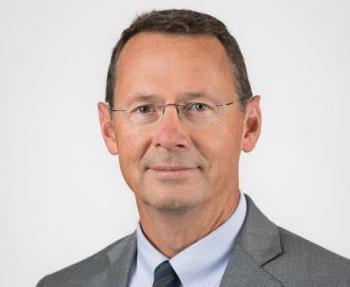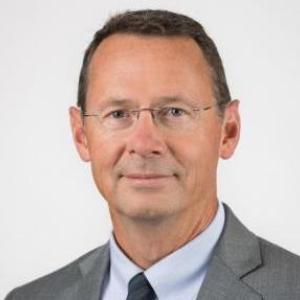Mark Fourre: We must finish strong by continuing to protect ourselves and those around us
There is hope on the horizon as we prepare to enter a new year with the COVID pandemic. Three vaccines have been proven safe and effective in numerous clinical trials and they are making their way through the approval process.
The State of Maine has been working on a distribution plan for some time, and MaineHealth has played a vital role in that process.
It appears that the vaccine will be given first to health care workers who have direct clinical contact with patients and those most at risk, including the elderly. This is likely to happen as early as mid-December.
Since I no longer have significant direct clinical contact with patients, and despite my position as president of Pen Bay Medical Center (PBMC) and Waldo County General Hospital (WCGH), I will have to wait my turn. However, when it is my turn, I will eagerly be vaccinated.
The hope generated by the prospects of a vaccine is tempered by what we are seeing here and now. As I write this, Maine is experiencing the spike in COVID-19 infections that we had hoped to avoid.
In the first week of December, Maine routinely recorded 300 or more new cases a day. This after many months of only isolated infections and very few deaths.
During the spring and summer, I attributed the earlier low numbers to the isolation created by our rural landscape and to the commitment by so many community members to wear a mask, maintain a distance of six feet from others and practice good hand hygiene. I still believe that is true. I can only imagine how much worse the current spike would be if we had not taken these basic precautions early on.
And so here we are, somewhere between hope and the current spike in infections. It is a precarious place; here pandemic fatigue finds room to thrive.
As defined by the World Health Organization (WHO), pandemic fatigue is a predictable reaction to sustained and unresolved adversity in people’s lives. Symptoms include the loss of motivation to follow protective measures and stay informed. It leaves people feeling complacent, alienated and hopeless. It puts them and everyone around them at risk.
As far as I can tell, our community as a whole has so far held pandemic fatigue at bay, although I have no doubt that many people are challenged by it. I know that I feel it daily. I would rather not wear a mask, and Zoom meetings stopped being a novelty long ago.
I also recognize that many on our care teams at PBMC and WCGH face even greater challenges. Many have to wear a mask continuously through a 12-hour shift. All have had to give up things that were common before the pandemic, like having a bottle of water at their workstation or coming together to celebrate a colleague’s birthday over cake and coffee.
I have no doubt that they, too, are weary of all the limitations and new measures that we have adopted to keep them and our patients safe. And yet, whether through brute need or professional commitment, they have found the strength to resist pandemic fatigue. Or perhaps they have embraced it fully and without reservation and in so doing, found the drive to carry on.
Whatever the reason, I am in awe of the care teams at both hospitals and senior living facilities – including those who work directly with patients and those in support roles. The challenge for the rest of us is to muster the same strength until the vaccine is widely available.
And we must find the strength. Even if a vaccine is approved this week, as seems likely, we are only at the midpoint of the pandemic. The vaccines must still be produced, distributed and administered. The magnitude of this exceeds any vaccination effort to date.
There were only 169 million people in the U.S. and 2.7 billion people in the world when a polio vaccine was approved in 1954.
Today the U.S. population exceeds 320 million people and the world population tallies at 7.8 billion people. It will be a monumental task to administer the vaccine to everyone who wants it. Moreover, while the vaccine will be effective at preventing a person from getting COVID-19, we know that a small percentage of vaccinated individuals will not become immune from the injection and are still at risk of contracting COVID.
As a result, we all are likely to be wearing masks and keeping our distance from one another for many months after the first vaccinations are administered.
In other words, pandemic fatigue is likely to be with us for some time. The only question is whether we give in to it or find ways to endure. The internet is full of suggestions about how to do this. These can be generalized as taking care of your body, limiting your news intake, finding activities that lower your stress, connecting with others, accepting your feelings, practicing gratitude and creating new traditions. I think these are good suggestions, and I would encourage everyone to try them.
Another approach is to take a lesson from the many veterans who, in their desire to serve, now work at PBMC and WCGH. One of those people is Hannah Parenteau, RN, BSN, who works as a nurse in the Stockton Springs Regional Health Center.
Earlier this year, Hannah volunteered at some risk to herself at the Tall Pines long-term care facility in Belfast when it was struggling with a serious COVID-19 outbreak. This meant she had to isolate from her husband and children and serve a 14-day quarantine before returning to work at WCGH.
When asked how she found the energy to carry on in the face of such sacrifices, Hannah offers a response that exemplifies the spirit of both our veterans and our care team members: “There’s the saying you learn in the military that goes, ‘Embrace the suck.’ You are taught to consciously accept extremely unpleasant but unavoidable situations and to find strength in them.”
If the pandemic has left you anxious or depressed, I want you to know you’re not alone. Rich and poor, Black and white, urban and rural: No one has escaped the weight of this pandemic. Indeed, fear of the disease, social isolation, economic insecurity and the loss of loved ones has taken its toll on all of us, and we all want to be finished with COVID-19.
The problem, of course, is that COVID-19 is not finished with us. However, the end is in sight. We expect the first vaccines to be administered this month and hopefully a vaccine to be available to everyone who wants it as early as this summer.
But to get there, we must commit to finishing strong by continuing to protect ourselves and those around us by wearing a mask, social distancing and practicing good hand hygiene. In short, we must continue to embrace the suck, knowing that this extremely challenging and unavoidable situation is, gradually, drawing to a close.
Mark Fourre is CEO of Pen Bay Medical Center and Waldo County General Hospital
Event Date
Address
United States




























